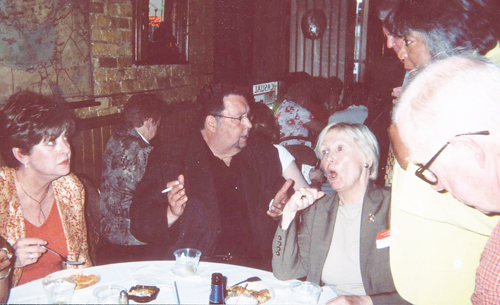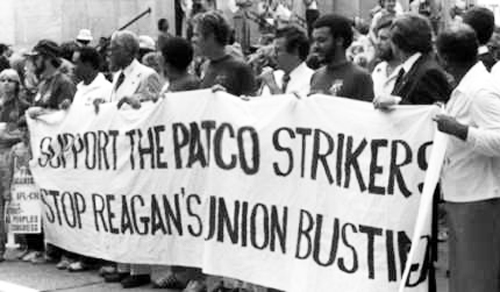When a 'SCAB' became a 'replacement worker' in the eyes of an officer of the CTU... How the leaders of the Chicago Teachers Union expunged the word 'SCAB' from union discussions...
 Tom Reece (above, with cigarette) became President of the Chicago Teachers Union after the death of Jacqueline Vaughn in early 1994. Vaughn's death created a struggle for power within the leadership of the "United Progressive Caucus" (UPC) and Reece was selected from the Vice Presidency of the union to take Vaughn's place. He ruled the union from 1994 through 2001, when he was defeated by Deborah Lynch and her PACT caucus. During the time he was President of the CTU, Reece became a champion apologist for the revised vocabularies ordered by the ruling class after the demise of Communism in the late 1980s and early 1990s. Among other things, Reece went along with the Amendatory Act creating mayoral control, "high stakes" testing programs, and the "CEO model" of school governance for Chicago. Reece also ordered that the word SCAB not be used describing those who had crossed union picket lines in the past. Substance photo. When did a SCAB become a "replacement worker"? And who ordered that Orwellian shift in the realities behind words long used in union? By the 1990s, the Chicago Teachers Union was facing major changes in the way the ruling class was ordering most people in how to view the world. A well organized right wing proclaimed that as a result of the fall of the Soviet Union that "socialism" had died with Soviet-style Communism and "markets" were the reality of the entire world. A group of people within the Democratic Party, mostly at the national level, worked to assure "globalization" (even at the expense of working people and American unions), creating the "New Democrats" and a system called "triangulation" to determine what policies the party of the once New Deal should follow.
Tom Reece (above, with cigarette) became President of the Chicago Teachers Union after the death of Jacqueline Vaughn in early 1994. Vaughn's death created a struggle for power within the leadership of the "United Progressive Caucus" (UPC) and Reece was selected from the Vice Presidency of the union to take Vaughn's place. He ruled the union from 1994 through 2001, when he was defeated by Deborah Lynch and her PACT caucus. During the time he was President of the CTU, Reece became a champion apologist for the revised vocabularies ordered by the ruling class after the demise of Communism in the late 1980s and early 1990s. Among other things, Reece went along with the Amendatory Act creating mayoral control, "high stakes" testing programs, and the "CEO model" of school governance for Chicago. Reece also ordered that the word SCAB not be used describing those who had crossed union picket lines in the past. Substance photo. When did a SCAB become a "replacement worker"? And who ordered that Orwellian shift in the realities behind words long used in union? By the 1990s, the Chicago Teachers Union was facing major changes in the way the ruling class was ordering most people in how to view the world. A well organized right wing proclaimed that as a result of the fall of the Soviet Union that "socialism" had died with Soviet-style Communism and "markets" were the reality of the entire world. A group of people within the Democratic Party, mostly at the national level, worked to assure "globalization" (even at the expense of working people and American unions), creating the "New Democrats" and a system called "triangulation" to determine what policies the party of the once New Deal should follow.
By late 1993, the tragedy of the Chicago Teachers Union was beginning. After a harrowing negotiation for a new contract, CTU president Jacqueline Vaughn lost her remission to cancer. Vaughn died in January 1994. Following her funeral, there was a power struggle within the UPC over who should run to be her successor, and Tom Reece became the compromise candidate, heading a ticket that was committed in many many ways to the same policies as the New Democrats.
When Reece ran for CTU President in May 1994 (I was his opponent) his supporters claimed that he had been "anointed" by Jacqueline Vaughn to be her successor. They also began portraying Reece as an African American, since internally many union members believed that Vaughn should be succeeded by an officer who was black. Reece defeated his opponent in the May 1994 CTU election and began a long process of shifting both the rhetoric and the reality of the union to the right.
By 1995, Reece was assuring the union's members that mayoral control and the "CEO model" would not hurt the union. Reece even went so far as to claim that the loss of the contractual rights of union members (the most dramatic being the ability to enforce class size and seniority rehiring by grievances) were not a loss because they simply became Board of Education policy-- and the Board members would do the same as if they were union rights.
One of the strangest claims made by Reece once Jackie Vaughn was safely gone was that unions had been defeated by Ronald Reagan when Reagan broke the air traffic controllers union, PATCO, during a strike during Reagan's first term. Like much inverting of reality and history since, Reece's claims that unions couldn't (not shouldn't) strike during the 1990s ignored the actual history of the union Reece had been helping to lead.
 Although thousands of union workers from other unions (as above) joined picket lines against President Ronald Reagan's union busting attacks on PATCO, the ironies of PATCO's own realities were ignored in later revisionist histories. PATCO, along with the Teamsters, was one of the few unions to support Reagan for President in the 1980s election. One of the most crippling realities within the AFL-CIO from the 1950s through the "Reagan Years" was that the unions' leadership devoted more energy to its international anti-Communism than to organizing in the USA. The PATCO strike -- and Ronald Reagan's vicious union busting and strike breaking -- had taken place in 1981. There were dozens of ironies during the PATCO strike. For one, PATCO was one of the few unions that had supported Reagan for President the previous year. Reagan himself was the only U.S. President to have once been a trade union president (he headed the Screen Actors Guild during the height of its anti-Communist days). As the history of the PATCO events reads:
Although thousands of union workers from other unions (as above) joined picket lines against President Ronald Reagan's union busting attacks on PATCO, the ironies of PATCO's own realities were ignored in later revisionist histories. PATCO, along with the Teamsters, was one of the few unions to support Reagan for President in the 1980s election. One of the most crippling realities within the AFL-CIO from the 1950s through the "Reagan Years" was that the unions' leadership devoted more energy to its international anti-Communism than to organizing in the USA. The PATCO strike -- and Ronald Reagan's vicious union busting and strike breaking -- had taken place in 1981. There were dozens of ironies during the PATCO strike. For one, PATCO was one of the few unions that had supported Reagan for President the previous year. Reagan himself was the only U.S. President to have once been a trade union president (he headed the Screen Actors Guild during the height of its anti-Communist days). As the history of the PATCO events reads:
"At 7 a.m. EST on August 3, 1981, the [PATCO] union declared a strike, seeking better working conditions, better pay, and a 32-hour workweek. In addition, PATCO wanted to be excluded from the civil service clauses that it had long disliked. In doing so, the union violated 5 U.S.C. (Supp. III 1956) 118p (now 5 U.S.C. � 7311), which prohibits strikes by federal government employees. Ronald Reagan declared the PATCO strike a "peril to national safety" and ordered them back to work under the terms of the Taft-Hartley Act of 1947. Only 1,300 of the nearly 13,000 controllers returned to work. Subsequently, at 10:55 a.m., Reagan included the following in a statement to the media from the Rose Garden of the White House: "Let me read the solemn oath taken by each of these employees, a sworn affidavit, when they accepted their jobs: 'I am not participating in any strike against the Government of the United States or any agency thereof, and I will not so participate while an employee of the Government of the United States or any agency thereof.'" He then demanded those remaining on strike return to work within 48 hours, otherwise their jobs would be forfeited. At the same time, Transportation Secretary Drew Lewis organized for replacements and started contingency plans. By prioritizing and cutting flights severely, and even adopting methods of air traffic management that PATCO had previously lobbied for, the government was initially able to have 50% of flights available." [Summary from Wikipedia, which is accurate and well footnoted].
So -- did Reagan's union busting in 1981 against a right wing professional union of federal workers really end the ability of unions to strike?
The Chicago Teachers Union was the most dramatic example of how the "PATCO example" was not true, yet by the mid-1990s, the leaders of the CTU were pushing the right wing version of "history." And Tom Reece was in the center of those lies.
Yet the CTU had engaged in successful strikes in 1983, 1984, 1985 and 1987 -- in every one of them retaining pay, benefits, and working conditions that that the Board of Education tried to take away. Yet Reece blithely ignored the facts of history, because he was in fact preaching a revisionist historiography that conformed to the new orthodoxy that was becoming dominant not only in corporate media, but also in the leadership of most American unions. Despite recent recognition that the power of working people (as well as pay, benefits, and working conditions) declined during the 25 years after Reagan won office, what is often left out is that the leaders of many American unions did not "lose" those things -- the leadership surrendered to a ruling class offensive that outsmarted as well as out-organized them.
Reece's PATCO talking points were just a microcosm of what was taking place at the top of most American unions during the 1990s and early 2000s. American workers may have remained militant, but without militant leaders in the unions (and other working class organizations), the workers were doomed to what was growing -- and what has burst out in the 2016 election campaigns through both the Trump and Sanders rebellions.

